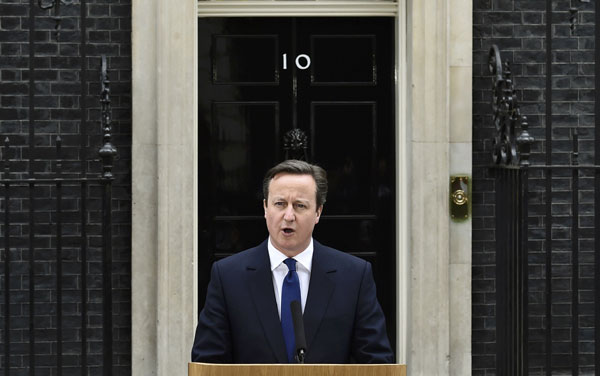Queen kick-starts race to 10 Downing Street
(Xinhua) Updated: 2015-03-30 21:46
 |
|
Britain's Prime Minister David Cameron speaks as he returns to Number 10 Downing Street, after meeting with Queen Elizabeth at Buckingham Palace in central London March 30, 2015.[Photo/Agencies] |
LONDON -- British Queen Elizabeth II dissolved Parliament Monday, triggering an age-old electoral process that allows virtually anybody to bid for a seat in the British House of Commons and beginning what should prove to be an exciting election campaign.
For a modest fee of 500 pounds (about $743) any citizen of Britain or the Irish Republic can stand for election. Five years ago, around 4,200 candidates stood for election. On April 9, the doors close on nominations from people wanting to stand.
Most commentators will eagerly be charting the fortunes, or misfortunes of the big-three parties, Conservatives, Labor and the Liberal Democrats. Even the wisest of pundits are reluctant to gamble on the outcome on election day, May 7.
New kids on the political block, UKIP, or the United Kingdom Independence Party, will cause upsets across the country. Initially starting out as an anti-European Union Party vowing to organize a divorce between Great Britain and the EU, UKIP has enjoyed a rapid rise in popularity. Many voters intend to back UKIP, citing the lack of action by the main parties on immigration into Britain.
Hundreds of thousands of people have flooded into Great Britain since the EU granted membership to Eastern European countries. Under EU rules, citizens of Europe have free access to all member states, including Great Britain. Many Britons, particularly in areas where job vacancies are scarce, blame immigrants for taking jobs at lower wages.
Whether true or false, feelings about rising immigration are running high with UKIP seen as a party that will control, if not slam the door, on high immigration.
Meanwhile, Labor is predicted to lose ground in Scotland to the Scottish National Party which has enjoyed its biggest ever surge in support in the wake of the Scottish Independence Referendum.






